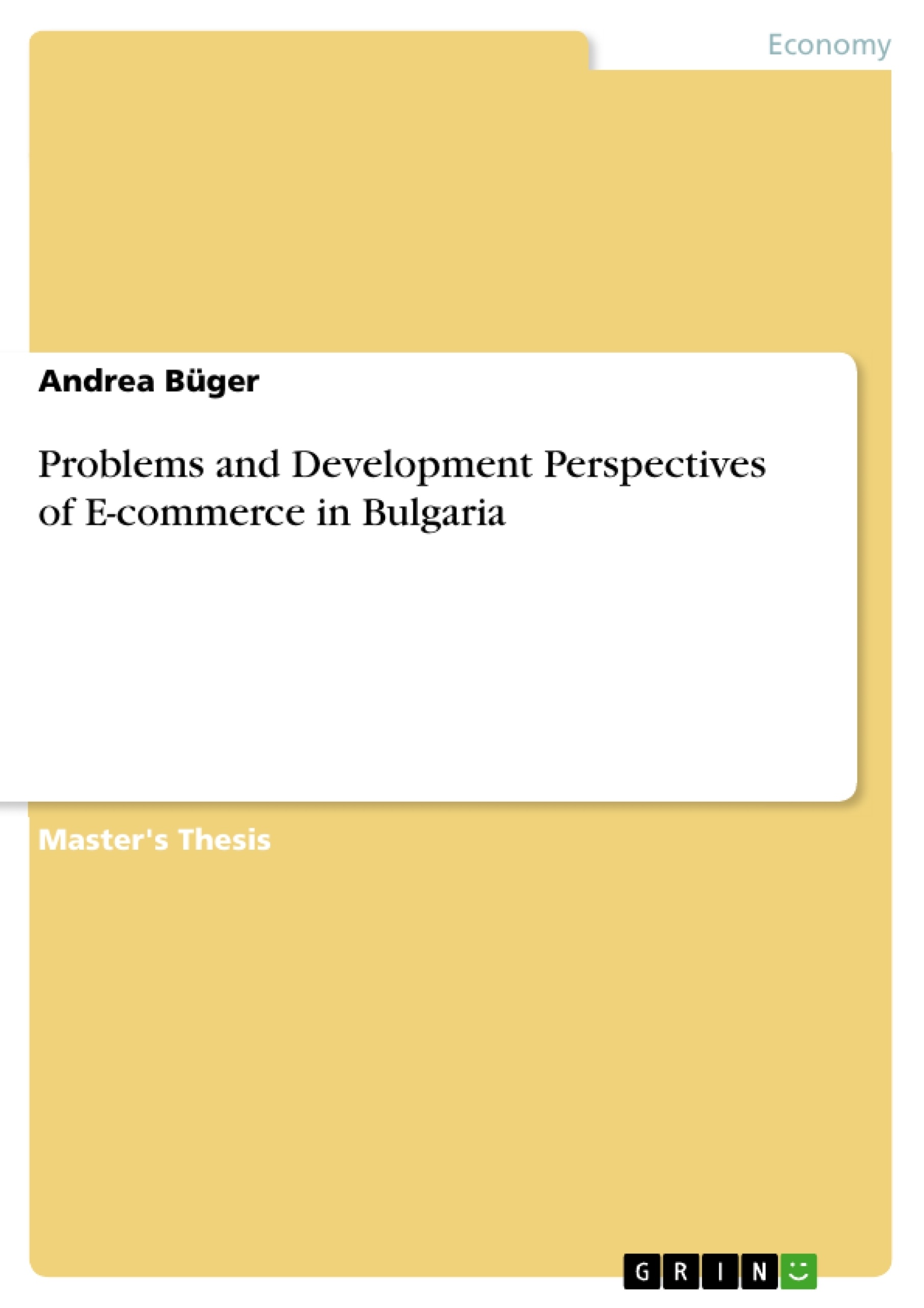This thesis explores the current state, challenges, and growth opportunities for e-commerce in Bulgaria within the context of both national and European markets.
As digital technologies reshape commercial activities, e-commerce has emerged as a powerful channel for businesses, offering convenience to consumers and global reach for companies. This research examines the primary factors influencing the success of e-commerce, including its advantages over traditional commerce and the regulatory frameworks governing its operations, particularly in the context of European Union standards and Bulgaria’s adoption of these regulations.
Inhaltsverzeichnis (Table of Contents)
- Introduction
- Chapter 1: The Nature and Characteristics of E-commerce
- Difference Between E-commerce and Traditional Commerce
- Regulatory Regimes
- Chapter 2: Trends in E-commerce in Bulgaria and the EU
- The E-commerce Market in Bulgaria
- Trends in the European Market
- Chapter 3: Issues and Perspectives
- Data Protection Issues
- Perspectives and Trends
- Conclusion
Zielsetzung und Themenschwerpunkte (Objectives and Key Themes)
This thesis aims to analyze the current state and development of e-commerce in the Bulgarian market, evaluating its advantages and disadvantages. It explores the evolution of e-commerce, successful management strategies, and market trends in both Bulgaria and the European Union.
- Development of the e-commerce concept and key success factors.
- Comparison of e-commerce advantages over traditional commerce.
- Analysis of e-commerce trends in Bulgaria and the EU.
- Identification of challenges and opportunities within the Bulgarian e-commerce market.
- Formulation of conclusions and recommendations for the future development of e-commerce in Bulgaria.
Zusammenfassung der Kapitel (Chapter Summaries)
Chapter 1: The Nature and Characteristics of E-commerce: This chapter provides a foundational understanding of e-commerce, differentiating it from traditional commerce. It explores the evolution of the internet from a simple information space to a platform for diverse business models and geographical reach. Key perspectives from scholars like V. Dimitrova, B. Koicheva, and A. Glavcheva highlight the competitive advantages of digitalization and the broad scope of e-commerce activities, including virtual product viewing, selection, and payment processing. The chapter also clarifies distinctions between "e-commerce" and "e-business," emphasizing that e-commerce specifically focuses on the online buying and selling of goods and services.
Chapter 2: Trends in E-commerce in Bulgaria and the EU: This chapter delves into the specific trends shaping the e-commerce landscape in Bulgaria and the broader European Union. It analyzes the market size and growth patterns within Bulgaria, providing insights into the current state of the e-commerce sector in the country. The analysis then expands to explore broader European trends, identifying key similarities and differences with the Bulgarian market. By comparing and contrasting data from both regions, this chapter offers a comprehensive understanding of the forces driving e-commerce expansion and the challenges faced by businesses operating in these markets.
Chapter 3: Issues and Perspectives: This chapter focuses on the challenges and opportunities facing the future of e-commerce, particularly in Bulgaria. It identifies key issues such as data protection concerns, which are vital for building consumer trust and ensuring legal compliance. Furthermore, this chapter examines future trends and opportunities, projecting potential growth areas and suggesting strategies for businesses to capitalize on the ongoing evolution of the e-commerce landscape. It provides insights into the potential for continued expansion and identifies areas needing further attention to ensure sustainable development.
Schlüsselwörter (Keywords)
E-commerce, Bulgaria, European Union, digitalization, online retail, market trends, competitive advantage, data protection, regulatory regimes, business models, consumer behavior.
Häufig gestellte Fragen
What is the main focus of this document?
This document is a language preview focusing on e-commerce, particularly in Bulgaria and the European Union. It includes a table of contents, objectives, key themes, chapter summaries, and keywords.
What topics are covered in the table of contents?
The table of contents outlines the following sections: Introduction, Chapter 1 (The Nature and Characteristics of E-commerce), Chapter 2 (Trends in E-commerce in Bulgaria and the EU), Chapter 3 (Issues and Perspectives), and Conclusion.
What are the objectives and key themes of the thesis?
The thesis aims to analyze the state and development of e-commerce in Bulgaria, evaluate its advantages and disadvantages, and explore successful management strategies and market trends. Key themes include the development of the e-commerce concept, comparison of e-commerce advantages, analysis of trends in Bulgaria and the EU, identification of challenges and opportunities, and formulation of conclusions and recommendations.
What are the main points discussed in Chapter 1: The Nature and Characteristics of E-commerce?
Chapter 1 differentiates e-commerce from traditional commerce, explores the evolution of the internet, and highlights the competitive advantages of digitalization. It also clarifies the distinction between "e-commerce" and "e-business," focusing on online buying and selling.
What are the main points discussed in Chapter 2: Trends in E-commerce in Bulgaria and the EU?
Chapter 2 analyzes the trends shaping the e-commerce landscape in Bulgaria and the broader European Union. It examines the market size, growth patterns in Bulgaria, and compares them with European trends.
What are the main points discussed in Chapter 3: Issues and Perspectives?
Chapter 3 focuses on the challenges and opportunities facing the future of e-commerce, particularly in Bulgaria. It identifies key issues such as data protection concerns and examines future trends and opportunities for businesses.
What are some of the keywords associated with this document?
The keywords include: E-commerce, Bulgaria, European Union, digitalization, online retail, market trends, competitive advantage, data protection, regulatory regimes, business models, and consumer behavior.
What are some of the data protection issues mentioned in the text?
The text mentions data protection as a vital concern for building consumer trust and ensuring legal compliance in the e-commerce sector.
Where does the text focus its study of e-commerce?
The text primarily focuses on e-commerce in Bulgaria and, to a lesser extent, in the broader European Union.
- Quote paper
- Andrea Büger (Author), 2020, Problems and Development Perspectives of E-commerce in Bulgaria, Munich, GRIN Verlag, https://www.grin.com/document/1518124



